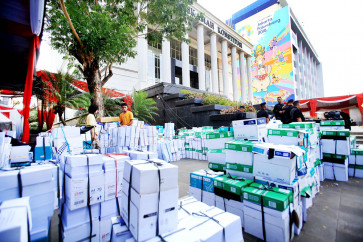Popular Reads
Top Results
Can't find what you're looking for?
View all search resultsPopular Reads
Top Results
Can't find what you're looking for?
View all search resultsHard labor at Constitutional Court
Change text size
Gift Premium Articles
to Anyone
A
fter the dispute over the presidential election was settled, many assumed that the duties of the Constitutional Court were at an end. Nothing could be further from the truth. From the conclusion of that trial until Aug. 9, the court was working harder than ever in the vastly complex legislative election disputes.
These elections determined almost the entire legislature. In addition to voting for the President and Vice President on April 17, Indonesians also voted for representatives of the Regional Representatives Council (DPD) and the House of Representatives. They also elected members of the regional legislative councils (DPRD), the provincial, regency and municipal councils. Hundreds of thousands of candidates competed for over 22,000 seats.
With such an enormous number of different elections, the controversies generated are legion. Such elections are frequently subject to accusations of corruption, as their small scale allows a relatively minor distribution of funds the potential to sway an election. Additionally, simple human error, bureaucratic mistakes and miscalculations may have a profound effect, becoming increasingly likely to influence the outcome in smaller elections where votes are less numerous.
The large number of political parties, 16 nationally and four regionally, each of which may have an interest in mounting a challenge to any given election, exponentially expands the quantity of possible disputes.
The result has been some 260 cases, spread over more than twice as many electoral regions. Each case may involve disputed elections at various levels of government and for multiple different areas within each region, every one of which represents a separate issue that must be judged.
These are not simple cases that can be determined at a glance. Where a legitimate challenge exists, deciding whether an election followed correct legal procedure requires in-depth analysis of long lists of vote tallies and the review of copious amounts of evidence. Moreover, the simplest cases, where the evidence is clear, are discharged by the Elections Supervisory Agency (Bawaslu). The cases left to the Constitutional Court are tricky, complex and time-consuming.
This is exhausting work. The nine justices of the Constitutional Court were split into three panels in order to deal with the vast amount of cases they were assigned.


















